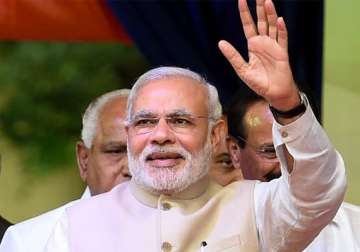PM Modi asks cola cos to blend aerated drinks with fruit juice
Tumkur (Karnataka): Prime Minister Narendra Modi today asked soft drink makers like Pepsi to try and mix aerated drinks with 5 per cent fruit juice to help distressed farmers find a new market for their

Tumkur (Karnataka): Prime Minister Narendra Modi today asked soft drink makers like Pepsi to try and mix aerated drinks with 5 per cent fruit juice to help distressed farmers find a new market for their produce.
“We drink Pepsi, Coca-Cola and I do not know how many similar beverages are available in the market. The trade runs into billions of rupees. I have asked the companies if they can blend 5 per cent natural fruit juice in the beverages they make,” Modi said after inaugurating the country's first integrated food park here.
“I am not asking for much. If 5 per cent of juice from fruits produced by our farmers is added, the farmer will not be forced to search for a market to sell. A single decision can ensure billions of rupees of trade,” he said.
Modi added that he has already asked the Central government's research bodies to work on the possibility of blending cola drinks, which are widely considered unhealthy, with natural fruit juice.
By doing so, he said, farmers will not be forced to dump their produce and let it go waste because of unremunerative prices and the country can save Rs 30-40,000 crore by reducing the wastage of food products through processing.
According to a report by Indian Council for Research on International Economic Relations released last December, the consumption of non-alcoholic beverages is expected to increase by 16.5-19 per cent over the next three years in the country.
An annual rate of 16.5 per cent and non-corporate manufacturers at 19 per cent. The estimates are based on an assumed gross domestic product growth of 7 per cent, which is much higher than the 5 per cent growth several economists have forecast.
The country's beverage market is largely unorganised, with nearly 75 per cent of the demand serviced by companies in the unorganised sector.
In his 20-minute speech, Modi stressed on the importance of proper storage, processing and value additions, which will be done at the park.
He also underscored the need for adopting more scientific methods of farming. Meanwhile, over Rs 250 crore has already been invested by the Kishore Biyani-led Future Group in the park and it has plans to invest over Rs 750 crore more over 2-3 years.
Besides, the company plans to open two more such parks at Kharagpur in West Bengal and another in Madhya Pradesh as it expands into the Fast Moving Consumer Goods (FMCG) space with its own food brands.
The farmer can get his produce to the food park, which will help in providing proper storage and process it to ensure a longer shelf life. Value additions like turning it into ready to eat items like rotis and pani puris, will also be done, Biyani said.
Minister of State for Food Processing Harsimrat Kaur Badal said the government is planning to open four more such parks across the country this fiscal and take the number up to 17 over time.
Kaur said such facilities will help control the worrisome food inflation, which has been persistently hovering at the double digit mark, leading to a slew of problems like a high interest rate regime.
At the event, Modi said his administration is committed to providing the necessary infrastructure, including facilities to export food products by sea.
He said there is an increased awareness about Indian food globally and the companies here should leverage that and make ready-to-eat products like curries.
Modi also stressed on the need to capitalise on the opportunity presented by the demand for organic food, saying regions along the Himalayas and in the north east, untouched by modern farming till now, can produce the required stuff.
With growth being the rallying theme, Modi said the country can progress only if the purchasing power of the villagers grows.